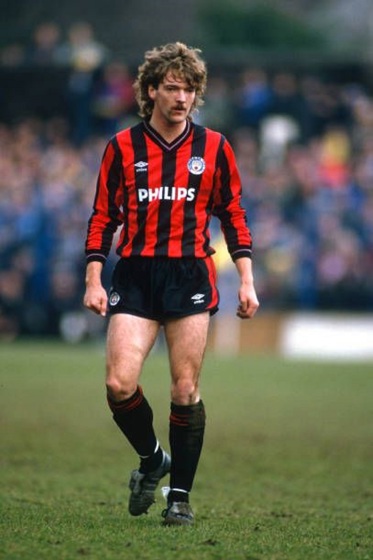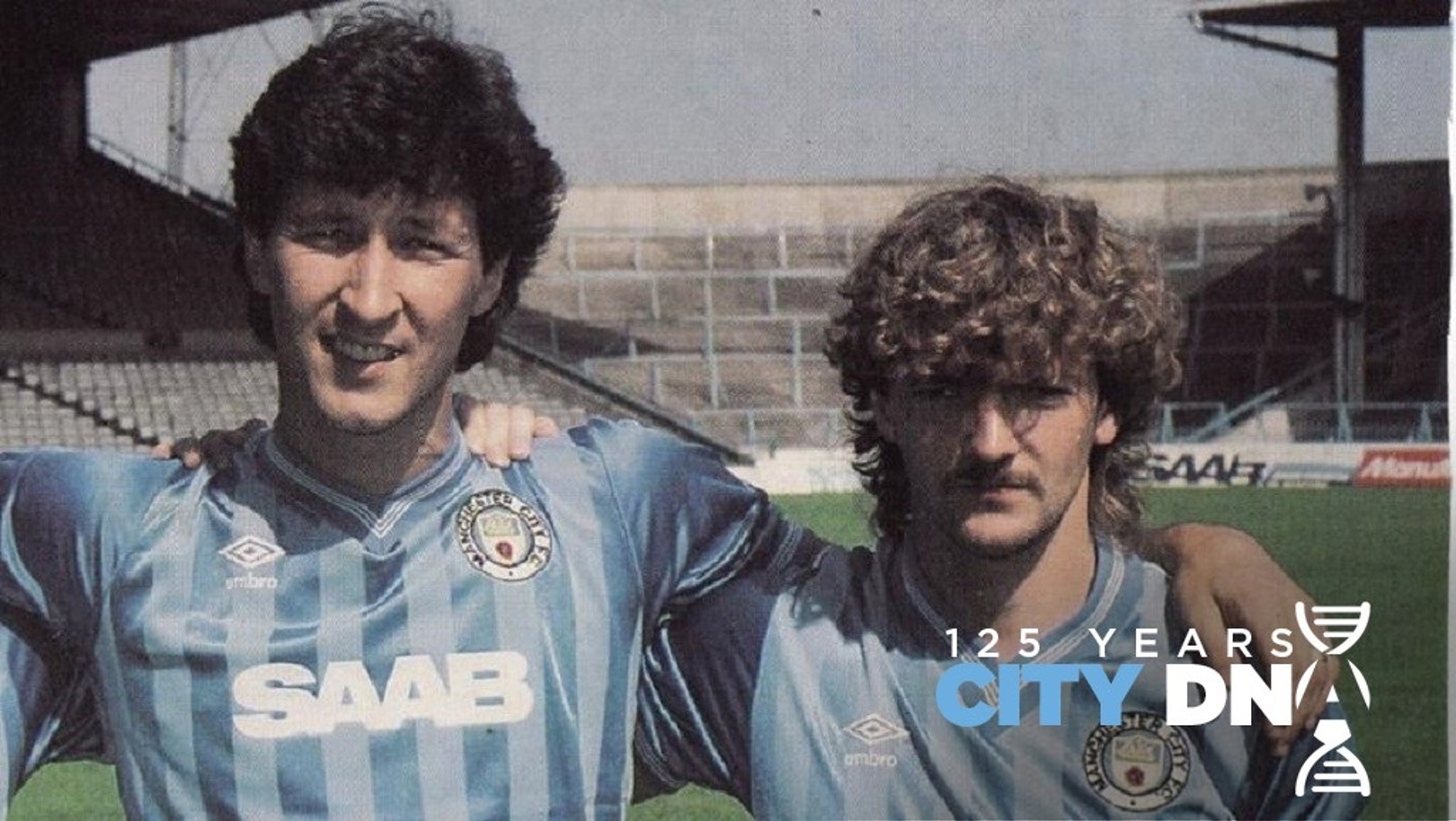That’s not to say there isn’t fine judgement, knowledge and gut-feeling involved, but just occasionally, the stars align for a period of time when everything clicks into place.
Case in point, Billy McNeill’s arrival at City in 1983 and the transfer policy he was forced to adopt in order to try and get the Club promoted back to the top-flight.
To say the cupboard was bare was an understatement.
City’s squad back then was a mixture of homegrown youngsters and free transfer journeymen.
For McNeill, the contrast between City and his former club Celtic couldn’t have been greater.
In Scotland, McNeill had been a one-club man during his playing career, winning 23 trophies including the European Cup as part of the famed ‘Lisbon Lions’ team.
His move into management saw him inevitably end up back at Celtic, where he added four Scottish Premier League titles and eight trophies in total in just five years back at Parkhead.
McNeill was rumoured to be a target for Manchester United before Ron Atkinson took over and he instead became manager of City who had just lost their top-flight status for the first time in 17 years.
Resurrecting the ailing giant that City had become appealed to McNeill who could see the potential of a club who could easily pull in crowds of 40,000 for the bigger matches – and this at a time when English attendances were at an all-time low.
Relegation meant City had lost players such as Dennis Tueart, David Cross and Kevin Reeves, with Trevor Francis and Joe Corrigan leaving the season before.

The Club had no real transfer funds for McNeill to plunder and any new arrivals would have to be either as a result of player sales or free transfers.
McNeill immediately set about seeking a couple of bargain basement strikers and looked north of the border to recruit players he knew were available and trusted.
Within five days he had identified two forwards who had a good track record but had perhaps lost their way career-wise.
Derek Parlane had played for Glasgow Rangers and scored in many an Old Firm derby during his 10 years at Ibrox and McNeill was well aware of his ability.
He had scored 112 goals in 254 games for Rangers before earning a move to Leeds United where he spent three seasons, though struggled somewhat at Elland Road.

He went out on loan to Bulova in Hong Kong and at 30, it seemed his career was gradually winding down.
McNeill, however, felt Parlane would be the ideal goal-poacher to lead his City team and, available on a free transfer, he snapped up Parlane without hesitation.
Five days later, he had found another forward he felt could do a job for the Blues.
Jim Tolmie had made a big impression with Morton as a teenager, clocking up 90 appearances and winning a Scotland Under-21 cap.
The diminutive winger had left for Lokeren in Belgium, but had failed to settle, scoring just once in 18 games.
CITYZENS AT HOME | Fun & educational activities to do at home
Knowing he was keen to return to the UK, plus Lokeren were eager to recoup some of their outlay, McNeill offered just £30,000 for the 22-year-old and the Belgians readily accepted.

City now had two Scotland international forwards that McNeill had paid peanuts for – now the Blues’ boss just needed to pair to gel.
Though City were expected to bounce straight back from relegation, Division Two (now the Championship), had numerous sleeping giants in 19834/84.
Aside from the Blues, there was Chelsea, Newcastle United, Leeds United and Sheffield Wednesday.
McNeill would bring in other players as the season progressed, but most were journeymen free transfers – the Parlane and Tolmie partnership simply had to work.
City started the campaign away to Crystal Palace and the new Scottish strike-force immediately seemed to strike up an understanding.
Parlane scored on his debut and the live-wire Tolmie, sensing the opportunity to at last make a real impression on a big stage was impressive throughout as City won 2-0.
Tolmie then scored in a 2-1 away defeat to Cardiff on the Bank Holiday Monday two days later, but it was the pair’s home debut against Barnsley that proved cause for optimism for the 25,105 crowd at Maine Road.
Parlane and Tolmie looked as though they’d played together for years, linking well and reading each other’s game and both found the net with Tolmie netting a brace in a 3-2 win against the Tykes.
Both were a hit on the terraces with the tall, classy Parlane an instinctive fox-in-the-box and Tolmie an energetic bundle of invention and creativity.
A 0-0 draw at Fulham was followed by a 2-1 win at Portsmouth with the tartan duo again bagging a goal each.
RETRO COLLECTION Buy your classic City shirt here
City were taking their expected place amongst the early front-runners with 10 points from a possible 15 and McNeill’s transfer acumen was quite rightly praised.
The next game, however, would see City fans’ optimism shift up another gear as Blackburn Rovers were thrashed 6-0 at Maine Road – Parlane grabbing a hat-trick and Tolmie also on the score-sheet.
And it kept getting better.
Three more wins on the bounce – all by a scoreline of 2-1 – and both strikers scoring at least one goal between them put City on 22 points from a possible 27 and well on course for an immediate return to the top flight.
Parlane had eight goals in nine games and Tolmie seven from nine – a combined return of 15 goals – not bad for a total £30,000 outlay!
A 6-0 win over Torquay United in the League Cup (the first leg ended 0-0) saw Parlane bag his second City treble and Tolmie, not to be outdone, scored a brace taking the duo’s total to 20 in 11 matches.
This was the peak of the Parlane/Tolmie partnership, but the pair weren’t finished yet.
A defeat at Charlton was followed by a 2-1 win over Middlesbrough – Tolmie and Parlane the scorers, of course, but doubts as to the Blues’ promotion hopes surfaced after a trip to Tyneside.
Newcastle United has signed Kevin Keegan and had Peter Beardsley and Chris Waddle in their stellar forward line – Keegan was superb, Waddle unplayable and Beardsley sublime as the hosts won 5-0.
Compared to City’s £30,000 outlay, the Magpies were shopping at Harrods while the Blues were rummaging around jumble sales – and it had started to show.
City responded with successive wins over Shrewsbury and Brighton – Parlane and Tolmie netting in the latter – before a demoralising 2-0 loss at Carlisle United.
Parlane’s goal in the 1-1 draw at Derby and Tolmie’s winner in a 1-0 win at Chelsea kept City in the top three, but another loss to a promotion rival – Sheffield Wednesday – played in front of a Maine Road crowd of 41,862, was a huge blow to City’s promotion hopes.
Gradually, results began to stutter and the goals for Tolmie and Parlane started to dry up – the pair netted just two goals each in the last 15 games and City’s promotion bid slowly derailed.
By the end of the campaign, McNeill had guided his team to a fourth placed finish, 10 points behind promoted Newcastle United in third with play-offs still several years away.
City’s bargain basement duo had played a combined total of 82 games, scoring 34 goals – they hadn’t helped the Club regain top flight status, but they came mightily close.
The cost per goal was £365 and it proved money well spent.
Parlane and Tolmie played occasionally the following season before Parlane left for Swansea and Tolmie headed to Sweden with Markaryd IF the season after having become a bit-part player for City.
For six months, they took on Messrs. Keegan, Waddle and Beardsley, outscoring the Newcastle trio plus Chelsea’s prolific Kerry Dixon before they finally ran out of gas.
It was, however, great while it lasted…






